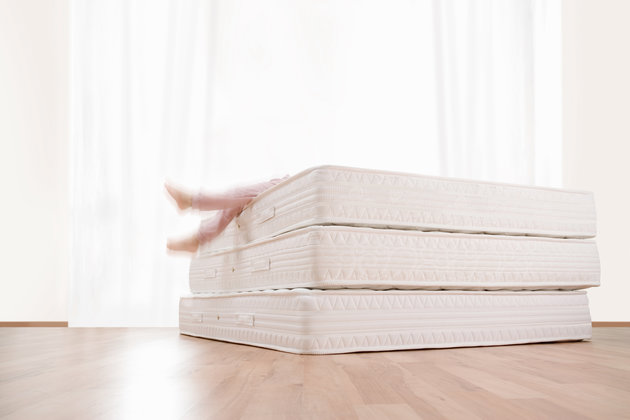You’ve had an active day, eaten right, taken a bath, donned your favorite PJs, and banished your phone and other screens from your bedroom — just like experts say to do for optimal sleep. But you’re still tossing and turning.
Turns out, your mattress may be to blame.
“The sleep surface is critical to sleep quality, and unfortunately is too often overlooked,” Terry Cralle, a certified clinical sleep educator and author of Sleeping Your Way To The Top, told The Huffington Post. Too many people reach for sleeping pills or an over-the-counter sleep aid without even considering what they are sleeping on, she said.
One study published in Applied Ergonomics found that new bedding systems improved measures of pain, stiffness, sleep comfort and quality across the board in a group of 62 men and women compared with their old beds, which on average were more than nine years old.
Want to know more? Here’s a five-point guide to picking out a new mattress:
1. Know when it’s time.
It’s time to buy new “when you sleep better away from home (in a hotel room or elsewhere), or if you prefer to sleep on your recliner or sofa,” Cralle said. Additional signs your mattress needs replacing include waking up with aches or pains, not feeling as refreshed in the morning or waking up in the night because you’re too hot or restless, she said.
Worn or sagging spots in the middle of your mattress or at the edges are physical signs your mattress has seen better days, according to recommendations from the National Sleep Foundation — and you should be able to sleep undisturbed on your side of the bed if your partner rolls over or gets up in the middle of the night. Though there is no hard and fast rule on how long to keep a mattress, most have a lifespan of about eight years, according to the NSF.
Cralle suggested evaluating how well your mattress is meeting your sleep needs after about seven years, or if you’ve had an injury or illness, a significant weight change or a new bed partner: “You may have forgotten how good a new comfortable mattress can feel.”
2. Understand what your mattress needs are.
In addition to everybody having their own body type and sleep needs, our bodies and those needs change over time. A mattress that was comfortable when we were 35 will not be as comfortable at 45, Cralle said. Factors like pain, weight loss, weight gain, and chronic disease can all affect our sleep preferences.
“The mattress that is comfortable for a 98-pound woman with arthritis may not be comfortable for a 250-pound man who sleeps hot,” she pointed out.
The mattress that is comfortable for a 98-pound woman with arthritis may not be comfortable for a 250-pound man who sleeps hot. Terry Cralle, a certified clinical sleep educator and author of Sleeping Your Way To The Top
But the good news is that new bedding technologies and materials means mattresses have come a long way, and there really is a mattress out there for everyone, Cralle said. “Just remember: The mattress that your neighbor raves about may not be the mattress you rave about.”
3. Make sure to pick the right mattress for you — not the fanciest, most-hyped one.
Experts say expensive mattresses are not always superior, and some mattresses are better suited for your sleep position than others. Overall, your mattress should feel comfortable


One Response
Noted